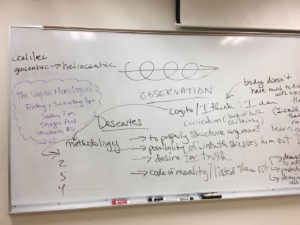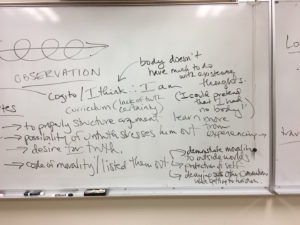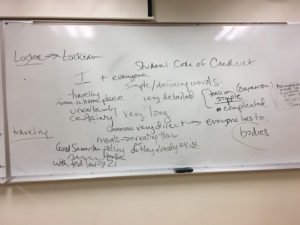The chapter, “The Art of Summarizing”, states that there is an art behind super summary writing. The author describes this art by breaking it down into a few key statements and then delving into that point and describing how to effectively execute that aspect of good summary writing.
Descartes/Student Code of Conduct Brainstorming
A record of our brainstorming from Wednesday, 2/15.



What We Learn from Misleading Article Titles
Quite often we end up reading articles we see on the Internet based on the little that we see in the title. Sure it can be misleading, but anything to catch the reader’s eye will do for the writer. This is the case when it comes to this article: http://abcnews.go.com/Technology/social-media-makes-student-writing-worse-teachers/story?id=19677570 Continue reading “What We Learn from Misleading Article Titles”
What Can We Learn from Misleading News Titles?
In order to help us pick what we want to view, websites add short summaries on the link of whatever is actually inside the link. The short summary will, in most cases, will be the title of the webpage. Sometimes, however, these short summaries are misleading as it is in the case of this webpage. The short summary is: “Social media makes student writing worse teachers”, while the actual title of the article is: “Social media makes for better student writing, not worse, teachers say.” Continue reading “What Can We Learn from Misleading News Titles?”
An invitation to cross-check
Normally, as recommended by the how-to-blog-here post, I’d embed links in my own text.
But I’m doing something different here because I want to draw attention to what this link itself says the article is going to be about: http://abcnews.go.com/Technology/social-media-makes-student-writing-worse-teachers/story?id=19677570
Go read the actual title and story. Do they match the link’s tiny summary? Is there anything to learn about critical reading and writing here?
Welcome, and how to blog here!
(The following language is adapted from Professor Schacht’s original “How to Blog Here” post): A post can be a few words plus a link or embedded video, or it can be a couple of paragraphs. It should be of interest to the group as a whole. It can contain some personal reflection or indicate a particular point of view, but it shouldn’t read like an entry in a personal diary. It should not serve as a space to vent.
Consider your audience: the whole community of folks at SUNY Geneseo (and perhaps beyond) who read, think, and write. Say something or point to something (e.g., an interview or article) that you think the community will find interesting, and explain how/why. Don’t worry whether what you have to say is “important” enough. Just be sure to keep it relevant to the community’s common interest. Continue reading “Welcome, and how to blog here!”
